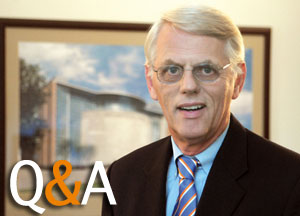CAMPUS
BUZZ
Q&A: Paul Paulus
Dean of the College of Science

Paul Paulus has overseen significant progress in the College of Science since being named interim dean in April 2004 and dean in November of the same year. UT Arlington Magazine spoke with him about how the changes are impacting the college’s development.
One of the most obvious changes is the Chemistry and Physics Building, which opened in March 2006. How important has that facility been to the growth of the College of Science?
It was absolutely critical. We have seen tremendous growth in the amount of highly funded research. Quality research cannot happen without space and equipment. It has helped us attract students and faculty, and it was instrumental in our becoming a Tier II computing center for the ATLAS detector (a particle physics experiment at the Large Hadron Collider). We have doubled our research funding in the last few years, and I see no reason this won’t continue at the same pace.
Won’t the college also have space in the new Engineering Research Complex set to open in 2011?
The College of Science will have 27 percent of the building, including some shared spaces such as conference rooms. Our space will include labs and offices for faculty and graduate students. We will be next to bioengineering and computer science engineering and also close to the materials science engineering area. These are departments the College of Science is already collaborating with. Co-locating will enhance that collaboration.
Why is co-locating important?
Numerous studies have shown that, even in these days of e-mail and mobile phones, it makes a difference if people are physically close. Easy access stimulates interaction. It’s as simple as running into colleagues in the hall and asking what they are working on. This interaction promotes collaboration, not only with faculty but also with graduate students.
You have hired about 60 faculty members during your deanship. How have they impacted the college?
UT Arlington has always done a very good job of teaching and mentoring students. It still does. But now we have brought in top-level researchers, outstanding scholars in their fields. Our first Welch Chair in Chemistry, Daniel Armstrong, brought with him a full staff of researchers. Dr. Armstrong and his team are conducting cutting-edge research, exploring chiral separations and identifying cells using capillary electrophoresis. His research has a great impact on pharmaceutical production and even has implications for homeland security. Our new chemistry chair, Sandy Dasgupta, is a renowned analytical chemist who studies the chemical constituents of atmospheric gases and has recently been researching iodine deficiencies that affect brain development in infants. Psychology Chair Bob Gatchel is internationally known for his research in pain management, and he is currently working on post-traumatic stress and chronic pain issues in military personnel. We have also brought in many fine, young faculty members as well. Our genome researchers, for example, are doing outstanding work. UT Arlington research is regularly published in the leading scientific journals.
We keep hearing that not enough students study science. How is the College of Science’s enrollment?
Last May we graduated our largest class ever. Biology Chair Jonathan Campbell just finished a report on biology majors. In five years, that number went from 939 to 1,503. But we don’t take that growth for granted. We have a number of programs geared at bringing young students to campus, everything from science camps to the Planetarium at UT Arlington. The planetarium is an important piece of the total picture. Thousands of school children come to see a show each year. But they get more than the show. We have undergrads in physics and chemistry, ExxonMobil Science Ambassadors, who do demonstrations to show these young students that science is interesting and fun. Without that exposure, the children might never consider careers in science.
Another aspect of enrollment that is critically important is enhanced support for graduate students in the STEM (science, technology, engineering and math) programs. Universities compete for top students, and we can’t attract them if we are not competitive with our stipends. In recent years, the University has begun a program of tuition stipends that greatly facilitates our recruitment of excellent graduate students.
— Sue Stevens
Other Stories
Deans named
for School of Urban and Public Affairs, Honors College
Study shows teen victims seek friends' help
United they stood
Supporters convinced legislators to trumpet the University’s research strengths
UT Arlington's new mace
Art meets Academia
Search
Contact Us
Office of University Publications
502 S. Cooper St.279 Fine Arts Building
Box 19647
Arlington, TX 76019-0647
